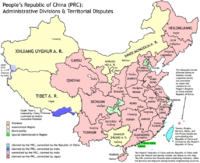See also: List of wars involving the People's Republic of China, Cross-Strait relations, and One-China policy
│
1625
│
1650
│
1675
│
1700
│
1725
│
1750
│
1775
│
1800
│
1825
│
1850
│
1875
│
1900
│
1925
│
1950
│
1975
│
2000
Map depicting territorial disputes between the PRC and neighbouring states. For a larger map, see here.
In addition to Taiwan, China is also involved in other international territorial disputes. Since the 1990s, China has been involved in negotiations to resolve its disputed land borders, including a disputed border with India and an undefined border with Bhutan. China is additionally involved in multilateral disputes over the ownership of several small islands in the East and South China Seas, such as the Senkaku Islands and the Scarborough Shoal.[213][214] On 21 May 2014 Xi Jinping, speaking at a conference in Shanghai, pledged to settle China's territorial disputes peacefully. "China stays committed to seeking peaceful settlement of disputes with other countries over territorial sovereignty and maritime rights and interests", he said.[215]
Emerging superpower status
China is regularly hailed as a potential new superpower, with certain commentators citing its rapid economic progress, growing military might, very large population, and increasing international influence as signs that it will play a prominent global role in the 21st century.[18][216] Others, however, warn that economic bubbles and demographic imbalances could slow or even halt China's growth as the century progresses.[217][218] Some authors also question the definition of "superpower", arguing that China's large economy alone would not qualify it as a superpower, and noting that it lacks the military power and cultural influence of the United States.[219]Sociopolitical issues, human rights and reform
See also: Human rights in China, Hukou system, Social welfare in China, Elections in the People's Republic of China, Censorship in China, and Feminism in China
The Chinese democracy movement,
social activists, and some members of the Communist Party of China have
all identified the need for social and political reform. While economic
and social controls have been significantly relaxed in China since the
1970s, political freedom is still tightly restricted. The Constitution of the People's Republic of China states that the "fundamental rights" of citizens include freedom of speech, freedom of the press, the right to a fair trial, freedom of religion, universal suffrage, and property rights. However, in practice, these provisions do not afford significant protection against criminal prosecution by the state.[220][221] Although some criticisms of government policies and the ruling Communist Party are tolerated, censorship of political speech and information, most notably on the Internet,[222][223] are routinely used to prevent collective action.[224] In 2005, Reporters Without Borders ranked China 159th out of 167 states in its Annual World Press Freedom Index, indicating a very low level of press freedom.[225] In 2014, China ranked 175th out of 180 countries.[226]Rural migrants to China's cities often find themselves treated as second-class citizens by the hukou household registration system, which controls access to state benefits.[227][228] Property rights are often poorly protected,[227] and taxation disproportionately affects poorer citizens.[228] However, a number of rural taxes have been reduced or abolished since the early 2000s, and additional social services provided to rural dwellers.[229][230]
Candlelight vigil on the 20th anniversary of the Tiananmen Square protests
Falun Gong was first taught publicly in 1992. In 1999, when there were 70 million practitioners,[235] the persecution of Falun Gong began, resulting in mass arrests, extralegal detention, and reports of torture and deaths in custody.[236][237] The Chinese state is regularly accused of large-scale repression and human rights abuses in Tibet and Xinjiang, including violent police crackdowns and religious suppression.[238][239]
The Chinese government has responded to foreign criticism by arguing that the right to subsistence and economic development is a prerequisite to other types of human rights, and that the notion of human rights should take into account a country's present level of economic development.[240] It emphasizes the rise in the Chinese standard of living, literacy rate and average life expectancy since the 1970s, as well as improvements in workplace safety and efforts to combat natural disasters such as the perennial Yangtze River floods.[240][241][242] Furthermore, some Chinese politicians have spoken out in support of democratization, although others remain more conservative.[243] Some major reform efforts have been conducted; for an instance in November 2013, the government announced plans to relax the one-child policy and abolish the much-criticized re-education through labour program,[129] though human rights groups note that reforms to the latter have been largely cosmetic.[236] During the 2000s and early 2010s, the Chinese government was increasingly tolerant of NGOs that offer practical, efficient solutions to social problems, but such "third sector" activity remained heavily regulated.[244][245]


No comments:
Post a Comment